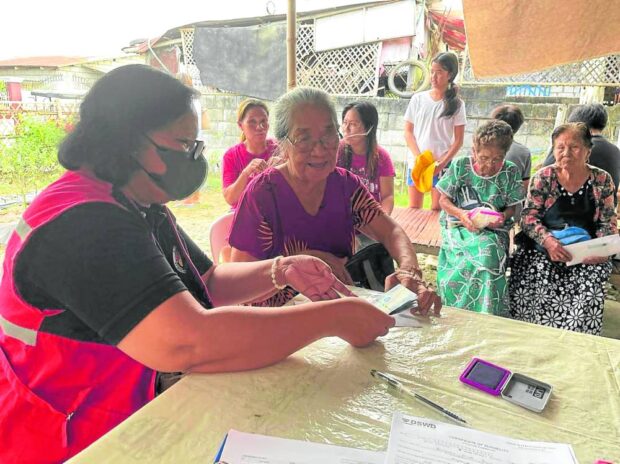
PAYOUT Social workers hand cash aid to survivors of wartime sexual abuses in Candaba, Pampanga, on Friday. —TONETTE T. OREJAS
CANDABA, PAMPANGA—Ignored for almost three decades since they broke their silence about World War II sexual abuses done to them in 1944, at least 20 survivors received financial aid from the Philippine government for the first time on Friday.
“It’s a step to justice,” said Maria Quilantang Lalu, president of the Malaya Lolas (Free Grandmothers), after Department of Social Welfare and Development (DSWD) personnel handed them P10,000 each in cash in their village in Mapaniqui in this town.
Three grandchildren of every lola were qualified to get educational assistance worth P5,000 each.
The first batch of recipients gathered in the garden of Lalu’s daughter, turning it into a place of happy laughter and chatter.
Lalu said the amount would come in handy for buying medicines but would not compensate for the abuses inflicted on them since the Imperial Japanese Army attacked their village on Nov. 23, 1944.
According to Lalu, she was only 8 years old when she was repeatedly raped by Japanese soldiers. She escaped the “Bahay na Pula (Red House),” a mansion-turned-garrison at nearby Barangay Anyatam in San Ildefonso town in Bulacan province, taking along her two younger siblings and reuniting with their parents a week later.
“I hope this happens again,” Lalu spoke aloud about the cash aid, making her plea heard by a DSWD official who came to oversee the event and who told the eight or so still able-bodied old women that the agency’s help was part of the DSWD’s regular program.
Framework
Lawyer Virginia Lacsa Suarez, chair of women’s group Kaisa-Ka, said that in her May 5 meeting with DSWD Secretary Rex Gatchalian, the United Nations Convention on the Elimination of all Forms of Discrimination Against Women (UN Cedaw) decision on March 8 was the framework for which Kaisa-Ka was seeking help for the old women.
There were 96 women who went public in 1996 with their ordeal. Out of the 26 living in 2018, only 24 managed to file their complaints before the UN Cedaw in 2019 after Philippine courts declined to help them demand reparation and a formal apology from Japan.
Four women had died since, leaving 20 others either bedridden or too old to be traveling.
Those who died before the March 8 Cedaw decision were also entitled to get state aid, according to Suarez.
In Friday’s payout, Perla Balingit received the money on behalf of her sister Fermina. Candelaria Soliman received the aid for her mother, Fortunata Mangalino, who died distraught a few years after escaping the garrison.
Not preclusion
The DSWD team, which arrived at past 2 p.m., went house-to-house to give the cash aid to bedridden survivors.
Suarez said the help of the DSWD and other agencies would “not preclude” the Malaya Lolas from asking President Marcos to issue an executive order setting aside a separate state fund for the old women.
She said the aid should not also prevent the government from implementing Cedaw’s recommendations for reparation, a formal apology, and turning the Bahay na Pula into a monument to memorialize the terrors of war on the so-called comfort women.
Cedaw issued a 19-page decision on March 8 saying the Philippine government “violated the rights of victims of sexual slavery perpetrated by the Imperial Japanese Army during the Second World War by failing to provide reparation, social support and recognition commensurate with the harm suffered.”
The commission then directed the Philippines to provide the victims with full reparation, including material compensation and an official apology for the continuing discrimination.”